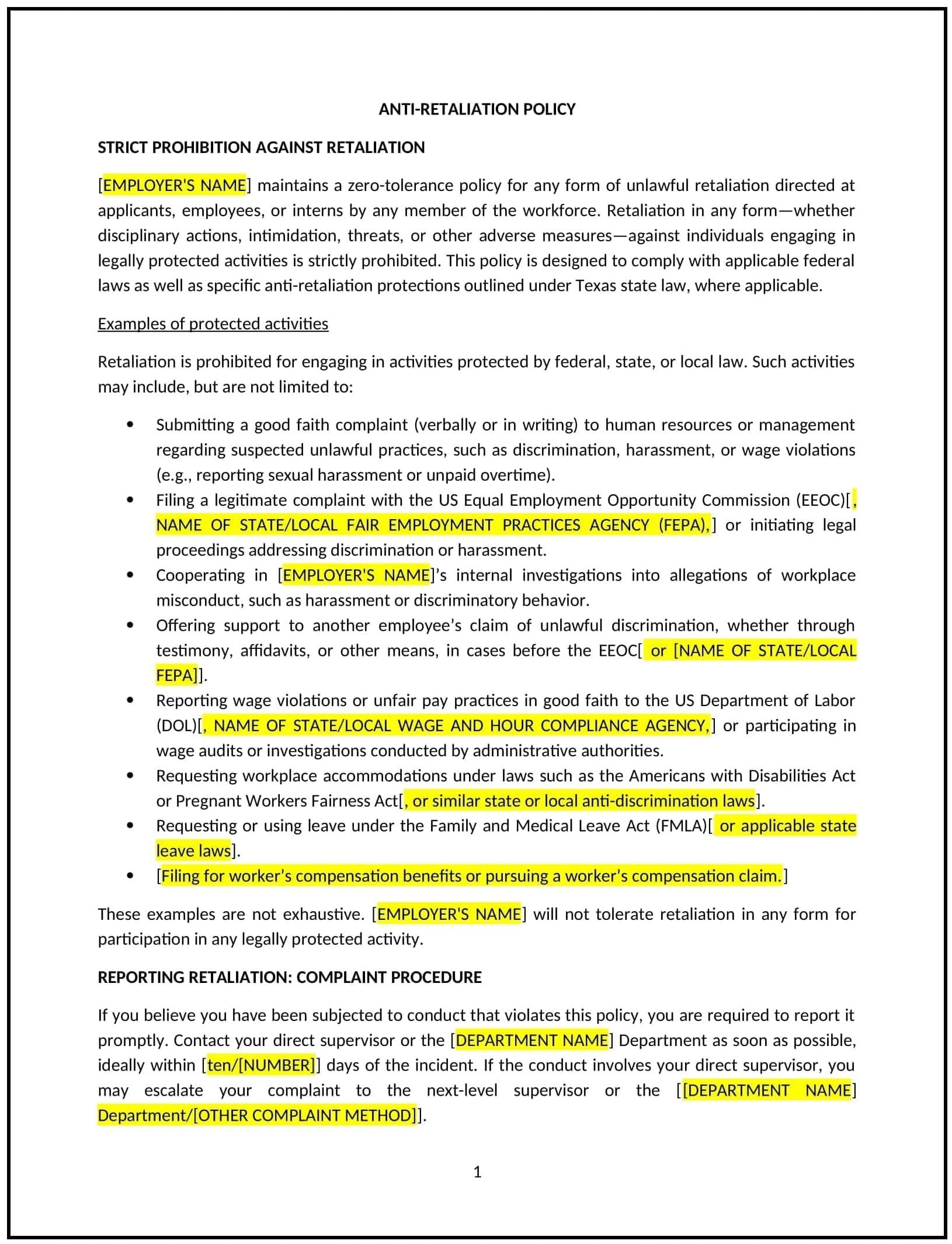Got contracts to review? While you're here for policies, let Cobrief make contract review effortless—start your free review now.

Customize this template for free
Anti-retaliation policy (Texas)
This anti-retaliation policy is designed to help Texas businesses establish clear guidelines for preventing retaliation against employees who engage in protected activities, such as filing complaints, participating in investigations, or asserting their legal rights. Whether businesses are managing complaints related to discrimination, harassment, or other workplace issues, this template provides a structured approach to preventing retaliation and promoting a fair and respectful work environment.
By adopting this template, businesses can support employee rights, reduce legal risks, and foster a culture of accountability and fairness.
How to use this anti-retaliation policy (Texas)
- Define protected activities: Clearly specify what constitutes protected activities under Texas state law and federal regulations, such as reporting workplace discrimination, participating in investigations, or asserting legal rights.
- Outline prohibited retaliation: Detail the actions that constitute retaliation, such as firing, demotion, harassment, or any adverse action taken against an employee for engaging in protected activities.
- Set reporting procedures: Provide clear instructions for employees to report retaliation, ensuring confidentiality and protection from further retaliation.
- Establish investigation processes: Explain how the company will investigate retaliation complaints, including timelines, confidentiality procedures, and the involvement of relevant personnel.
- Specify consequences for retaliation: Define the disciplinary actions that will be taken against employees who engage in retaliatory behavior, including corrective actions or termination depending on the severity of the violation.
Benefits of using this anti-retaliation policy (Texas)
This policy offers several benefits for Texas businesses:
- Promotes a fair and respectful workplace: A clear anti-retaliation policy helps ensure that employees feel safe reporting misconduct or asserting their rights without fear of retaliation.
- Reduces legal risks: By preventing retaliation, businesses reduce the risk of lawsuits or legal claims related to discrimination, harassment, or wrongful termination.
- Encourages compliance: This policy helps businesses comply with both Texas state laws and federal regulations, such as Title VII of the Civil Rights Act of 1964, by safeguarding employees’ rights.
- Improves employee morale: Employees are more likely to be engaged and loyal to a company that fosters a culture of fairness and supports their rights without retaliation.
- Enhances company reputation: A strong commitment to preventing retaliation enhances the company's reputation as a fair and ethical employer, which can improve employee retention and attract top talent.
Tips for using this anti-retaliation policy (Texas)
- Communicate clearly: Ensure that all employees are aware of the policy and understand their rights and the company's commitment to protecting them from retaliation.
- Provide training: Offer training to all employees, especially supervisors and managers, on the importance of the policy and how to respond if they receive a complaint of retaliation.
- Maintain confidentiality: Protect the confidentiality of employees who report retaliation, ensuring that they feel safe and confident in the reporting process.
- Investigate thoroughly: Conduct prompt, thorough, and impartial investigations into all claims of retaliation, and take appropriate corrective action when necessary.
- Review regularly: Update the policy to reflect changes in Texas state laws, federal regulations, or company practices related to retaliation and employee rights.